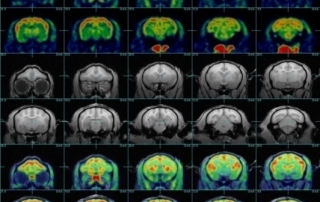About the Neuroscience and Behavior Unit

The Neuroscience and Behavior Unit provides services, training, consulting, and collaborative expertise in the areas of basic neuroscience, stress physiology, cognitive neuroscience, epigenomics, psychoneuroimmunology, and psychosocial processes in nonhuman primates. The Neuroscience and Behavior Unit research focuses on integrating multiple levels of analysis (social, psychological, physiological, neurobiological, and genetic) across the lifespan to help alleviate the burdens on individuals and society of mental illness and neurodegenerative disease.
For information about the Neuroscience and Behavior Unit, email Brenda McCowan, Ph.D., Unit Leader.
Select Research Highlights
- Demonstrated that robust postnatal brain plasticity results in the development of normal social behavior following early insult to the amygdala.
- Demonstrated that fetal Zika virus infection causes damage to the developing brain, even in infants with normal-sized heads and brains.
- Showed that concentrations of the neuropeptide vasopressin in cerebrospinal fluid are associated with low social functioning, and showed that similarly low concentrations of the same neuropeptide characterize children with autism spectrum disorder, a condition that also involves poor social function.
- Demonstrated that an individual’s social role in their group is associated with markers of inflammation.
- Discovered that the activation of the maternal immune system during pregnancy can lead to brain, immune, and behavioral outcomes that are similar to those seen in autism spectrum disorder and schizophrenia.
- Showed that gene therapy could affect brain and behavioral functioning in a model of Alzheimer’s Disease. This work has led to clinical trials in humans.
- Identified changes in synaptic boutons in the prefrontal cortex that were associated with memory deficits in a model of menopause.
- Found striking parallels in physiological organization between lonely humans and a naturally occurring model of loneliness in monkeys, leading to new studies of immune cell maturation in lonely monkeys.
- Our research with titi monkeys identified long-term effects of chronic intranasal oxytocin on juvenile social behavior, neural activity, anxiety-like behavior, and pubertal development.
- Identified sex differences in brain glucose uptake in titi monkeys that resemble those found in humans. Discovered the long-term effects of chronic intranasal oxytocin on adult pair bonding.
- Successfully showed that DREADDS (Designer Receptors Exclusively Activated by Designer Drugs) could be used in a nonhuman primate to temporarily inactivate brain structures.
- Showed that emotion regulation of juveniles receiving the widely used antidepressant fluoxetine (Prozac) was dependent on genotype for monoamine oxidase-A, a result that could explain the variation seen in children who are treated with selective serotonin reuptake inhibitors like fluoxetine.
- Demonstrated that the macaque autonomic nervous system codes for affective information in a manner identical to the human system.
- Showed that aspects of an individual’s social network, involving the identification of “friends” and “friends of friends” reduce infectious disease in individuals, which is contrary to established infectious disease theory.
- Linked early maternal care with offspring adult health outcomes via early epigenetic re-programming
